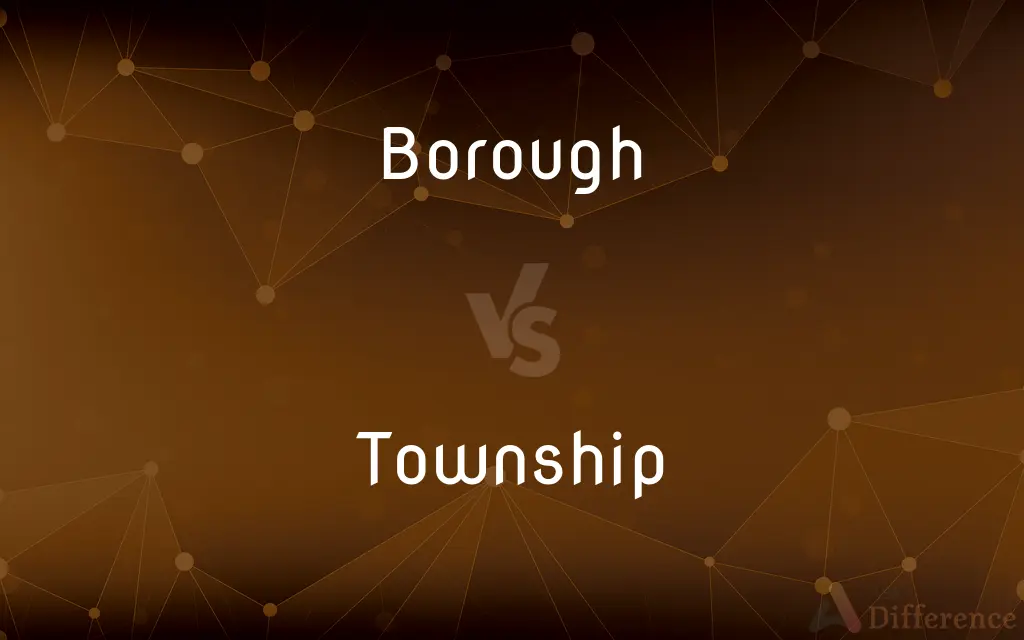Borough vs. Township — What's the Difference?
Edited by Tayyaba Rehman — By Fiza Rafique — Updated on March 17, 2024
A borough is a type of administrative division in some countries, often designated in urban areas, while a township generally refers to a subdivision of a county, more common in rural areas.

Difference Between Borough and Township
Table of Contents
ADVERTISEMENT
Key Differences
Boroughs are often found in urban or suburban contexts and can serve various administrative roles, from self-governing municipalities to minor subdivisions within larger cities. Townships, on the other hand, are typically rural or suburban administrative units that provide local government services, such as road maintenance and zoning, in areas not incorporated as cities or towns.
While boroughs might have more defined powers and responsibilities, potentially including the provision of city-like services (such as police and fire protection, schools, and zoning regulations), townships usually have a narrower scope of services, focusing on essential local governance and community needs. This distinction reflects their differing roles in urban versus rural management.
The governance structure within boroughs often includes a mayor and a borough council, responsible for making decisions and overseeing municipal operations. Conversely, townships are usually governed by a board of trustees or supervisors, which may have fewer powers, depending on the state or region's laws.
In terms of geographical coverage, a borough can encompass a wide range of urban environments, from densely populated city districts to smaller towns. Townships cover similarly varied terrains but are generally associated with less densely populated areas, serving as the basic unit of local government in many parts of the United States, especially in the Midwest and Northeast.
The historical development of boroughs and townships also differs; boroughs have origins in English medieval towns with certain privileges, while townships often trace back to the colonial land division system in America, designed to organize and distribute land among settlers.
ADVERTISEMENT
Comparison Chart
Definition
An administrative division, often in urban areas.
A subdivision of a county, usually in rural areas.
Governance
May have a mayor-council system.
Typically governed by a board of trustees or supervisors.
Services
Can provide comprehensive municipal services.
Focuses on basic local services and governance.
Geographical Scope
Ranges from city districts to small towns.
Usually covers less densely populated areas.
Historical Origins
Originates from medieval English towns.
Traces back to colonial American land division.
Compare with Definitions
Borough
Self-Governing Entity.
Our borough operates its own school district and police department.
Township
Local Governance Structure.
The township trustees approved the new fire station project.
Borough
Community Identity.
The borough festival celebrates our local heritage and community.
Township
Community Services Provider.
Our township provides zoning and public safety services.
Borough
Urban Administrative Division.
The borough council met to discuss the new zoning laws.
Township
Rural Administrative Unit.
The township oversees road maintenance for its rural roads.
Borough
Part of a Larger City.
Each borough in the city has its unique character and regulations.
Township
Land Division System.
Historical land surveys divided the territory into townships.
Borough
Historic Town Status.
The town gained borough status, granting it more autonomy.
Township
Subdivision of a County.
The county is divided into several townships, each with its governing body.
Borough
A borough is an administrative division in various English-speaking countries. In principle, the term borough designates a self-governing walled town, although in practice, official use of the term varies widely.
Township
A township is some kind of human settlement or administrative subdivision, with its meaning varying in different countries. While the term is occasionally associated with an urban area, this tends to be an exception to the rule.
Borough
A self-governing incorporated town in some US states, such as New Jersey.
Township
A subdivision of a county in most northeast and Midwest US states, having the status of a unit of local government with varying governmental powers.
Borough
One of the five administrative units of New York City.
Township
A public land surveying unit of 36 sections or 36 square miles.
Borough
A civil division of the state of Alaska that is the equivalent of a county in most other US states.
Township
An ancient administrative division of a large parish in England.
Borough
A town having a municipal corporation and certain rights, such as self-government.
Township
A suburb or city in South Africa formerly designated by the government as a predominantly black residential area.
Borough
A town that sends a representative to Parliament.
Township
The territory of a town.
Borough
A medieval group of fortified houses that formed a town having special privileges and rights.
Township
A subdivision of a county.
Borough
(obsolete) A fortified town.
Township
An area set aside for nonwhite occupation.
Borough
(rare) A town or city.
Township
A nonwhite (usually subeconomic) area attached to a city.
Borough
A town having a municipal corporation and certain traditional rights.
Township
A small town.
Borough
An administrative district in some cities, e.g., London.
Township
The district or territory of a town.
Borough
An administrative unit of a city which, under most circumstances according to state or national law, would be considered a larger or more powerful entity; most commonly used in American English to define the five counties that make up New York City.
Township
In surveys of the public land of the United States, a division of territory six miles square, containing 36 sections.
Borough
Other similar administrative units in cities and states in various parts of the world.
Township
In Canada, one of the subdivisions of a county.
Borough
A district in Alaska having powers similar to a county.
Township
An administrative division of a county;
The town is responsible for snow removal
Borough
An association of men who gave pledges or sureties to the king for the good behaviour of each other.
Borough
In England, an incorporated town that is not a city; also, a town that sends members to parliament; in Scotland, a body corporate, consisting of the inhabitants of a certain district, erected by the sovereign, with a certain jurisdiction; in America, an incorporated town or village, as in Pennsylvania and Connecticut.
Borough
The collective body of citizens or inhabitants of a borough; as, the borough voted to lay a tax.
Borough
An association of men who gave pledges or sureties to the king for the good behavior of each other.
Borough
One of the administrative divisions of a large city
Borough
An English town that forms the constituency of a member of Parliament
Common Curiosities
Can boroughs and townships overlap in terms of geographical areas they cover?
While both can cover a range of areas, boroughs are generally associated with more urban environments, and townships with rural or suburban areas.
Are there townships within boroughs?
Generally, no. Boroughs and townships are separate types of administrative divisions and do not overlap in this way.
Is there a size difference between boroughs and townships?
Size can vary widely for both, but boroughs are typically thought of as being more urban and possibly denser, while townships cover rural or less densely populated areas.
What are the main responsibilities of township governance?
Township governance primarily focuses on providing essential services like road maintenance, zoning, and sometimes public safety, tailored to the needs of rural or suburban communities.
What services do boroughs provide that townships might not?
Boroughs often provide comprehensive services similar to cities, including education and public safety, whereas townships focus on basic services like road maintenance and zoning.
How do residents participate in borough or township governance?
Residents can vote in elections for council or board members, attend public meetings, and participate in community consultations to influence decisions.
What is a borough?
A borough is an administrative division that can vary in size and function, often found in urban areas, and may have self-governing powers.
What is a township?
A township refers to a subdivision of a county, common in rural areas, responsible for providing basic local government services.
How do boroughs and townships differ in governance?
Boroughs may be governed by a mayor and council system with broader municipal powers, while townships typically have a board of trustees or supervisors with more limited powers.
How does the historical development of boroughs and townships differ?
Boroughs have their origins in medieval English towns with certain privileges, while townships in the U.S. originated from the colonial land division system to organize and distribute land.
Why might someone choose to live in a township over a borough?
Individuals might prefer townships for their rural or suburban character, lower population density, and potentially lower taxes, compared to the urban setting and higher services provision of boroughs.
How do boroughs and townships impact local education systems?
Boroughs may directly manage local schools and education systems, while townships might have less direct involvement, with education often overseen at the county level or by independent school districts.
Do all countries have boroughs and townships?
No, the use of boroughs and townships as administrative divisions varies by country, with some using one, both, or neither, depending on their own governance structures.
Can a borough also be a city?
In some regions, boroughs can have a status similar to that of a city, with significant autonomy and self-governance capabilities, depending on the local laws.
Can the boundaries of boroughs and townships change?
Yes, the boundaries can be adjusted due to developments, population changes, or administrative decisions, following legal processes.
Share Your Discovery

Previous Comparison
Compliance vs. Conformity
Next Comparison
Egret vs. StorkAuthor Spotlight
Written by
Fiza RafiqueFiza Rafique is a skilled content writer at AskDifference.com, where she meticulously refines and enhances written pieces. Drawing from her vast editorial expertise, Fiza ensures clarity, accuracy, and precision in every article. Passionate about language, she continually seeks to elevate the quality of content for readers worldwide.
Edited by
Tayyaba RehmanTayyaba Rehman is a distinguished writer, currently serving as a primary contributor to askdifference.com. As a researcher in semantics and etymology, Tayyaba's passion for the complexity of languages and their distinctions has found a perfect home on the platform. Tayyaba delves into the intricacies of language, distinguishing between commonly confused words and phrases, thereby providing clarity for readers worldwide.














































